Cowboys (and girls) return to Masbate
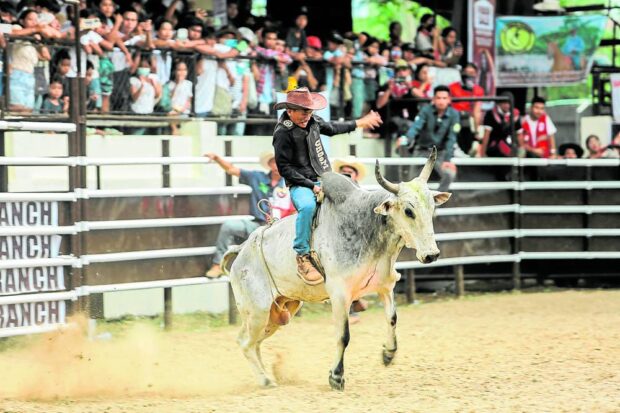
TEST OF SKILLS | In Masbate City, contestants wearing their best cowboy garb test their skills in bull riding and casting down during this year’s Rodeo Masbateño Festival, staged after a three-year pause due to COVID-19 restrictions. (Photo by MARK ALVIC ESPLANA)
MASBATE CITY, Masbate, Philippines — After three years, this capital city of Masbate saw tourists returning to witness the restaging of the Rodeo Masbateño Festival and to experience the local cowboy culture.
Benjamin Ferguson, 44, from Kentucky in the United States, said he felt lucky that his visit to the country for a family reunion in Masbate was “perfect timing” with the much-awaited return of the festival that celebrates the province’s cattle industry and the people behind it. The events were held from April 9 to April 16, right after Holy Week and even as most of the Bicol region was hit by Tropical Depression Amang.
“It was great personally seeing the cowboys and cowgirls wrestle with cows inside the arena. I’m impressed. They were very brave and talented,” said Ferguson, noting that the spectators’ delight was contagious.
Gerardo Presado, Masbate tourism officer, said the return of the Rodeo Masbateño Festival attracted thousands of tourists to the province.
“All hotels in the city were booked, and it was a clear indication that everyone was … excited to watch the event [again],” Presado said.
Article continues after this advertisementHe said hotel owners and operators had sought the provincial government’s assistance to ensure that visitors coming from different provinces and even abroad would be welcomed and would get accommodations.
Article continues after this advertisement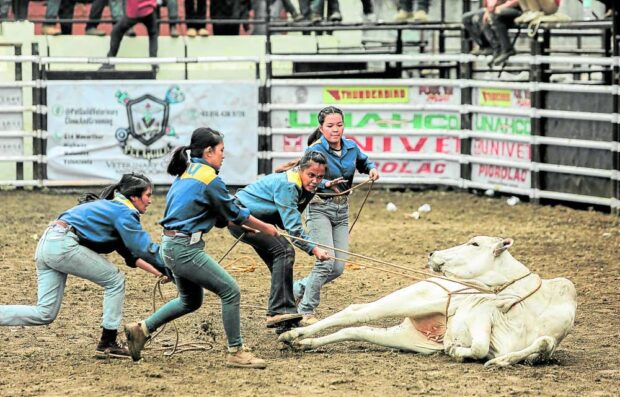
In Masbate City, contestants wearing their best cowboy garb test their skills in bull riding and casting down during this year’s Rodeo Masbateño Festival, staged after a three-year pause due to COVID-19 restrictions. (Photo by MARK ALVIC ESPLANA)
‘Mother of festivals’
The Rodeo Masbateño Festival, considered the “mother of all festivals” in Masbate, was started in 1993 by then Masbate Gov. Emilio Espinosa to showcase the province’s cattle industry. It attracted more spectators when former President Gloria Macapagal-Arroyo declared Masbate the “Rodeo Capital of the Philippines” on Sept. 2, 2002.
“The clamor [for] having the event again was so rewarding, especially seeing many new and old faces in the grand arena,” said Ruby Sanchez-Morano, president of the festival organizing group, Rodeo Masbateño Inc. (RMI).
Morano acknowledged that organizing the event was challenging after a three-year pause due to community lockdowns and travel and health restrictions imposed by the government to prevent the spread of COVID-19 in 2020. “Everything was back to zero [then],” she said.
The provincial government, however, gave RMI P2 million in financial assistance to help jumpstart the return of the Rodeo Masbateño Festival.
Organizers, Morano said, were unsure if their decision to bring back the festival was right.
“In fact, prior to the weeklong event, we conducted surveys through social media and, surprisingly, we received positive results emphasizing that [people] wanted [to experience the festival] again.”
During the festival, participants in several competitions, tourists and even locals dressed up in their best cowboy or cowgirl garb, complete with the signature hat, long-sleeved plaid shirts and leather boots.
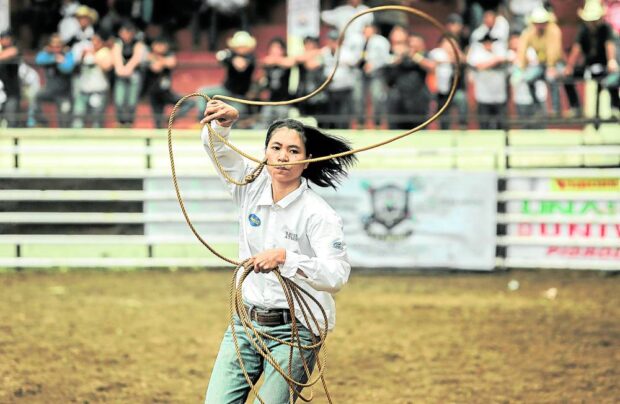
GIRL POWER | Events lined up for the Rodeo Masbateño Festival also test the skills of women involved in the cattle industry. (Photo by MARK ALVIC ESPLANA)
Animal welfare
Organizers made sure that animals featured in competitions during the Rodeo Masbateño Festival were healthy so these could avoid life-threatening injuries.
Dr. Hernando Dorongon, Masbate provincial veterinarian, said scouting for the cattle to be used for the competitions was “very critical” that it took them several months to prepare.
During the selection process, Dorongan said organizers selected cows that were between 3 and 5 years old, weighing 300 to 600 kilograms, and were healthy, active, and vaccinated.
“The 100 cattle used for the game were fresh from the ranches and [considered] ‘first-timers,’” he said.
Teams of veterinarians were monitoring the events, particularly bullwhipping, load carrying, cattle wrestling, cattle lassoing, “carambola,” bull riding and penning, to ensure the safety of the cows.
Dorongon said that after the games, they conducted thorough postcare assessments to make sure the cows were free from injuries.
“We gave them enough time to rest and sufficient vitamins to cope with stress before returning them to the field,” he said.
Aside from checking the health condition of the cattle, the committee that oversaw the events made sure that these would not violate the provisions of Republic Act No. 8485 or the Animal Welfare Act of 1998.
“Everything is legal, we secured the show permit and complied with all the necessary requirements,” Dorongon said.
Rotelo Veto Jr., team leader of contestants from Bukidnon province, said he was happy when he received news that Rodeo Masbateño would resume.
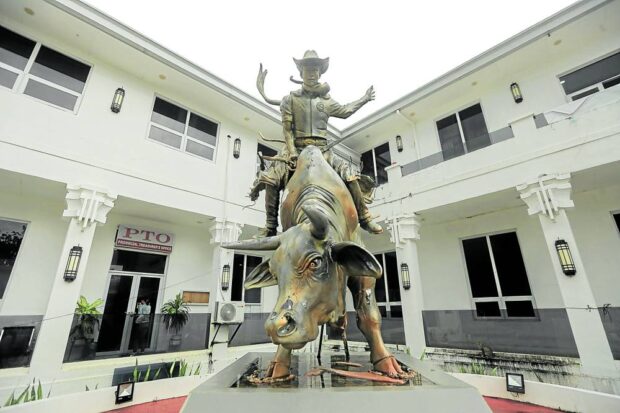
CELEBRATION | A concrete statue of a cowboy riding a bull, unveiled in 2017, honors the culture of Masbate as the “rodeo capital of the Philippines” at the provincial capitol grounds in Masbate City. (Photo by MARK ALVIC ESPLANA)
Big turnout
“We really waited for this and honestly, we missed the event because we’ve been joining for 15 times already,” says Veto, whose team successfully defended their 2019 championship this year.
“We underwent rigid training, particularly [focusing on] breathing exercises to sustain [our] stamina,” Veto says.
Leo Gosom, a member of the RMI board of trustees and rodeo director, said they were amazed at the turnout, where 49 teams signified their intention to join.
Gosom, however, said they trimmed the participants to 33 teams or 330 people so organizers could handle the events properly.
Herbie Aguas, the director of the Department of Tourism in the Bicol region, attributed the influx of tourists to the island province of Masbate to the ease of travel from the Luzon mainland.
“Thanks to multiple [ferry] schedules in Sorsogon, Albay, and Camarines Sur, travelers find it easy to reach the province,” Aguas said, noting that the resumption of tourism and the steady stream of visitors would benefit Masbateños.
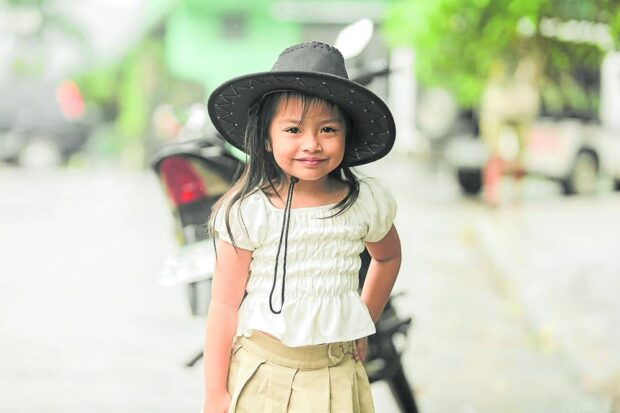
YOUNG FAN | A local girl shows off her cowboy hat, one of the staples of Masbate’s Western
fashion, during this year’s Rodeo Masbateño Festival. (Photo by MARK ALVIC ESPLANA)
According to Gov. Antonio Kho, the Rodeo Masbateño Festival is one way of showcasing the people and culture of Masbate.
Kho said more cows were also given away by the provincial government through the “juego de toro,” the most-awaited event in the festival where residents get to take home the cows that they will catch.
Morano said Masbate’s cattle industry continued to flourish despite the health and economic crises.
She said around 65 to 70 percent of Masbate’s agricultural area is devoted to cattle pastureland.
“Meat producers continue to increase, as well as the number of meat shops. This means the demand for our beef and related products has increased not only during the rodeo but year-round,” she said.
Philippine Statistics Authority data showed that Masbate had 19,742 head of cattle in backyard farms and 3,470 head in commercial farms as of Oct. 1, 2022, the Department of Agriculture in Bicol said.